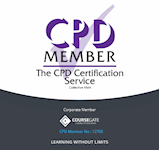PHP Programming Course
Exam Included . CPD Accredited Qualification . Lifetime access . Immediate Result
Course Gate
Summary
- Certificate of completion - Free
- Tutor is available to students
Overview
PHP Programming Course is suitable for anyone aspiring to or already working in this field or simply want to learn deeper into PHP.
If you require support, our experienced tutors are always available to help you throughout the comprehensive syllabus of this PHP Programming course and answer all your queries through email.
PHP is the world’s most popular programming language for building web applications and interactive websites.
This PHP Programming Course entails the fundamentals of PHP and equips you with advanced PHP development tools and techniques, you will understand the PHP data objects, as well as this PHP Programming course, provides an introduction to CodeIgniter. The PHP Programming course will help you learn PHP inside and out. You will learn how to use PHP with a MySQL database, and how to know if you should use CodeIgniter, Zend, Symfony, or CakePHP as your framework. This PHP Programming course presents the PHP structure and covers a top to bottom the most vital strategies used to assemble dynamic sites.
Course media
Description
What will you learn in this PHP Programming Course
Module 1
In this module, you will learn all about Welcome to the world of programming. Web Developers use PHP to create interactive, dynamic websites while making it easy to update and maintain, not to mention, prompt your visitors to purchase, join a list or even tell a friend,
Module 2
In this module, you will learn all about Let’s Start Coding. We’re going to tackle the basics to start with. Getting PHP to write things to the web browser, what variables are and how to use them…examples you can use in just about every web page you ever create.
Module 3
In this module, you will learn all about PHP Strings. contained within quotation marks. String values can be enclosed in either double quote or single quotes. Strings could be considered the building blocks of PHP considering that almost all of the data is going to come from what is contained within a string.
Module 4
In this module, you will learn all about PHP Variables. Variables are part of PHP programming and their purpose is to store a value, whether it be a number (integer), a sentence or phrase (string) or a letter (char). Every variable must have a name, and these names in PHP are case sensitive, meaning $you and $You would be considered different variables.
Module 5
In this module, you will learn all about Useful Variables. The example above simply sets the date command as a variable that is called $today and uses the echo command to display the date on the screen.
Module 6
This module will teach you about PHP Includes & Problem Solving. What happens when you want to add a new page to your site? You would typically have to change the menu on every single page to showcase the new link or item you wanted to add. The manual work involved would cost you a lot of time, and each time you went to update the links or add new ones, you would once again, have to update every other page that this menu appears on.
Module 7
This module will teach you about Tip When Creating Inc Pages. We just discussed how you could save a ton of time updating your websites using simple PHP code. This time, we are going to show you how you can use PHP to make your job as a Webmaster even easier.
Module 8
This module will teach you about Redirecting Using PHP. PHP is also very useful if you are looking to redirect your visitors to other pages or websites. For example, if you are updating your website and do not want people to see the index page, you could use PHP to direct them to a temporary page until you have completed the updates. You could also use PHP to redirect visitors to an external product page using your affiliate link.
Module 9
This module will teach you about Multiple Conditions. Often times, we have to evaluate multiple conditions, in this example, we have to list many different truck models, and in these instances using “Itself” can be a tad cumbersome (writing out a dozen “Itself’ conditions is quite tedious).
Module 10
This module will teach you about PHP Arrays. An array can be thought of as a single variable that stores more than a single value. An array uses a “key” to determine what value to reference.
Module 11
This module will teach you about PHP Loops. Using loops in conjunction with arrays is a great way to improve your PHP scripts, and eases the workload of repetitive tasks.
Module 12
This module will teach you about Note on PHP Math Functions. There is one more loop we are going to cover, and it’s called the
“For Each Loop”. Each Loop
If you wanted to loop through an Associative Array, you would use
the For Each to complete this task. Where the WHILE and FOR loops run until an error is encountered, the FOR EACH loop will run through every single element in the array.
Module 13
In this module, you will learn all about Functions. A function in PHP is really quite easy to understand. It’s a piece of code that can be named and re-used at any time. Functions can help us reduce our coding time significantly, by simply writing the code once and then defining it as a function that can be called on at any time to appear.
Module 14
In this module, you will learn all about PHP Sessions. When you dive deeper into PHP and come to the point where you are interested in displaying specific user/visitor data throughout different areas and pages on your website, it’s time to learn PHP sessions.
Module 15
In this module, you will learn all about Cookies. You have probably heard about cookies, in fact, you most likely have dozens stored on your computer from visits to different websites that you visit regularly or log into. As mentioned earlier, cookies store information on your computer from these visits.
Module 16
In this module, you will learn all about Introduction to MySQL. MySQL and PHP often work closely together, especially for web applications and developments. MySQL is often used in conjunction with PHP for the same reason that made PHP so popular. It is free, widely available and the majority of web hosts support it. There are, however other database systems that PHP works with, but MySQL is by far, the most common and well-known option.
Module 17
In this module, you will learn all about Making The Connection. Analysing the code above, the majority of the code should be pretty easy to understand. The DB name means “Database Name” (whatever you called the database when you created it inside of your hosting account, on your server).
Module 18
This module will teach you about Inserting Data. Placing data into a table is important, however, there are times you are going to want to extract data from a database.
Module 19
This module will teach you about Deleting / Removing Data. Just as we may wish to add data, there are times when removing data is required.
Method of Assessment:
Upon completion of the course, you will be required to sit for an online multiple-choice quiz based assessment, which will determine whether you have passed the course (60% pass mark). The test will be marked immediately and results will be published instantly.
Certification
After successfully completing the course, you will be able to obtain the certificates. You can claim a PDF certificate by paying a little processing fee of £2. There is an additional fee to obtain a hardcopy certificate which is £9.
Who is this course for?
PHP Programming course is suitable for anyone who wants to gain extensive knowledge, potential experience and professional skills in the related field.
Requirements
Our PHP Programming course is open to all from all academic backgrounds and there wants no specific requirements to attend this PHP Programming course. This PHP Programming course is compatible and accessible from any device including Windows, Mac, Android, iOS, Tablets etc.
Career path
This PHP Programming course opens a new door for you to enter the relevant job market and also gives you the opportunity to acquire extensive knowledge along with the required skills to become successful. You will be able to add our qualification to your CV/resume which will help you to stand out in the competitive job industry.
Questions and answers
Currently there are no Q&As for this course. Be the first to ask a question.
Certificates
Certificate of completion
Digital certificate - Included
Reviews
Currently there are no reviews for this course. Be the first to leave a review.
Legal information
This course is advertised on reed.co.uk by the Course Provider, whose terms and conditions apply. Purchases are made directly from the Course Provider, and as such, content and materials are supplied by the Course Provider directly. Reed is acting as agent and not reseller in relation to this course. Reed's only responsibility is to facilitate your payment for the course. It is your responsibility to review and agree to the Course Provider's terms and conditions and satisfy yourself as to the suitability of the course you intend to purchase. Reed will not have any responsibility for the content of the course and/or associated materials.



